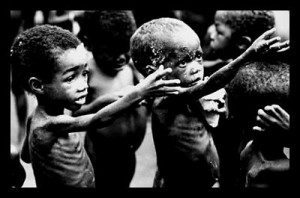Famine and Politics in Ethiopia

Ethiopia is a country defined by its environment. The East African nation has been plagued by droughts and famine throughout its history, plunging the people into an abject state of poverty. In the latter half of the 20th century, drought and famine became more prevalent, inciting political turmoil in Ethiopia.
These unfavorable environmental conditions especially devastated the northeastern Wollo and Tigray regions of Ethiopia. One of the most tragic events in the nation’s history was the 1958 famine in Tigray in which around 100,000 people perished.
In 1973, another brutal famine struck Wollo that resulted in the toppling of Ethiopia’s government. The reigning monarch Hailie Selassie’s inability to resolve the food crisis incited revolution. Selassie was removed from power and supplanted by a Communist junta under the infamous Mengistu Haile Mariam.
From 1983-85 Ethiopia suffered the worst famine in its history. Over 400,000 people died over the two year period. A combination of climate conditions and the policies of the incompetent Derg regime caused the famine.
After the fall of the Derg in 1991, Ethiopia stabilized before entering into a war with the neighboring country Eritrea in the late 1990s. Although the war has ended, Ethiopia remains one of the poorest nations in the world and has become a breeding ground for separatist groups like the Ogaden National Liberation Front and the Islamist terror group al-Ittihaad al Islami. Both of these groups, although their goals are different, pose a threat to the current government in Ethiopia. Moreover, the existence of radical Islamic terrorist organizations in Ethiopia could eventually harm the United States.
As Ethiopia continues to reel from the damages of famine, perhaps it would be wise for the United States to supply their East African ally with more aid. If Ethiopia is not provided for, the nation will spiral into another devastating cycle of coups. This would threaten the well being of the Ethiopian people, the stability of the region, and the national security of the United States.
– Josh Forgét
Source: BBC,The Borgen Project,Bahru Zewde
Photo: Word Press
